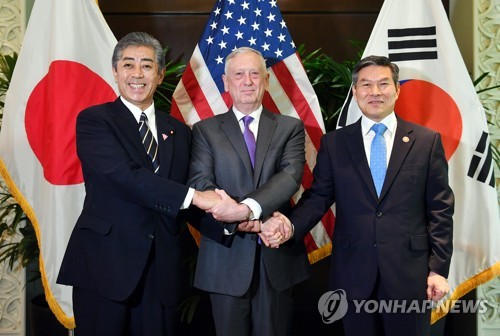- California Assembly OKs highest minimum wage in nation
- S. Korea unveils first graphic cigarette warnings
- US joins with South Korea, Japan in bid to deter North Korea
- LPGA golfer Chun In-gee finally back in action
- S. Korea won’t be top seed in final World Cup qualification round
- US men’s soccer misses 2nd straight Olympics
- US back on track in qualifying with 4-0 win over Guatemala
- High-intensity workout injuries spawn cottage industry
- CDC expands range of Zika mosquitoes into parts of Northeast
- Who knew? ‘The Walking Dead’ is helping families connect
S. Korea, U.S. agree to suspend another military exercise
WASHINGTON, Oct. 19 (Yonhap) — South Korea and the United States have agreed to suspend another military exercise to facilitate negotiations over North Korea’s nuclear weapons program, the Pentagon said Friday.
South Korean Defense Minister Jeong Kyeong-doo and U.S. Defense Secretary Jim Mattis decided to suspend the annual air exercise, Vigilant Ace, “to give the diplomatic process every opportunity to continue,” Pentagon spokeswoman Dana White said in a statement.
The two met in Singapore earlier in the day.
Vigilant Ace, which was slated for December, is the latest joint exercise to be suspended to encourage North Korea to dismantle its nuclear weapons program.
In June, U.S. President Donald Trump came away from a historic summit with North Korean leader Kim Jong-un in Singapore saying he would halt the “provocative” and costly “war games.”

This photo, provided by South Korea’s Ministry of National Defense, shows South Korean Defense Minister Jeong Kyeong-doo (R) with U.S. Defense Secretary Jim Mattis (C) and Japanese Defense Minister Takeshi Iwaya in Singapore on Oct. 19, 2018. (Yonhap)
The allies canceled the Ulchi Freedom Guardian drill, which was slated for August, along with two Korean Marine Exchange Program training exercises. Despite assurances from Seoul and Washington that the exercises are defensive in nature, Pyongyang has long condemned them as an invasion rehearsal against the regime.
Vigilant Ace was last carried out in December, involving more than 230 warplanes and around 12,000 personnel. The exercise drew keen attention because it came shortly after the North conducted its third test of an intercontinental ballistic missile and declared the completion of its “nuclear force.”
A second summit between Trump and Kim has been in the works, with Trump saying that it will take place after the Nov. 6 U.S. midterm elections, in one of three or four possible locations.
At the first summit, Kim committed to work toward “complete” denuclearization of the Korean Peninsula in exchange for security guarantees from the U.S. The two sides have since tried to hammer out the details as the U.S. wants to see verifiable steps toward denuclearization and the North demands an easing of sanctions against the regime.
White said the two defense chiefs agreed to “maintain close coordination and evaluate future exercises.”
“Both ministers are committed to modifying training exercises to ensure the readiness of our forces,” she said, adding that Mattis consulted his Japanese counterpart, Takeshi Iwaya, on the matter.
Speaking at his confirmation hearing last month, the nominee for commander of U.S. Forces Korea said the recent suspension of exercises likely hurt the allies’ defense posture.
“I think that there was certainly degradation to the readiness of the force for the combined forces,” said U.S. Army Gen. Robert Abrams. “That’s a key exercise to maintain continuity and to continue to practice our interoperability, and so there was a slight degradation.”











